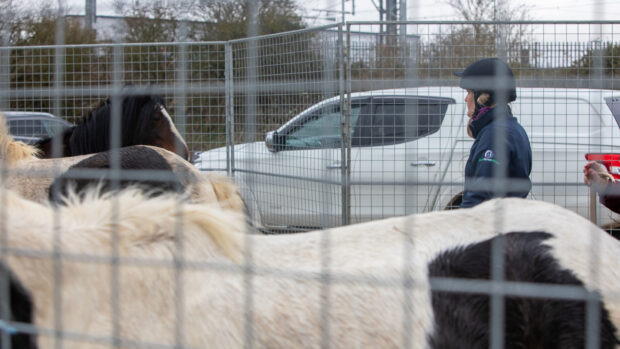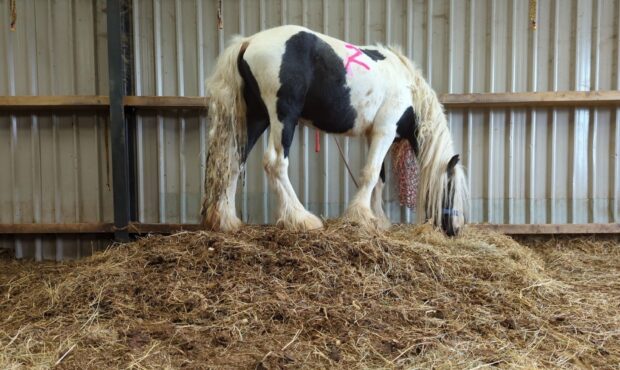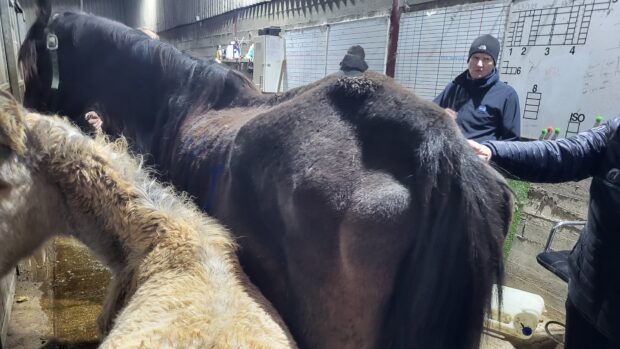Two women who allowed emaciated five horses to suffer – two had to be put down and one was so underweight he had a “thigh gap” – have been sentenced.
Charlie Virginia Hingley, 27, of Netherton, West Midlands, and Lucia Kate Stanton, 19, of no fixed address but linked to King Alfred Walk, Leeds, were sentenced at Birmingham Magistrates’ Court on 25 September.
At an earlier hearing Hingley had pleaded guilty to four offences of causing suffering to horses Sonny, Celly, Luna, and Bobby, between December 2022 and January 2023. Stanton admitted to causing suffering to miniature Shetland Waffles during the same period.
On 22 January witnesses contacted an equine bailiff after they saw a tractor being used to lift a collapsed horse, Celly, in a field in the vicinity of School Lane, Bromsgrove, Worcestershire. The bailiff attended and requested that Hingley contact a vet immediately. When the vet attended, a second horse, Sonny, was found collapsed and was in “such a poor state” he had to be put down on welfare grounds immediately.
Celly, who was in an emaciated condition, was relinquished by Hingley to the bailiff and removed from the site. The RSPCA was later called to check on the welfare of Luna, Bobby and Waffles, and RSPCA inspector Suzi Smith attended the field on 26 January, during which she called a vet over concerns for all three horses.
“My initial concern was for piebald mare Luna, and young Shetland Waffles, because both looked to be in poor body condition visually, despite fluffy winter coats, and Luna had rain scald on her back,” said Ms Smith.
“After taking a closer look at Luna, I could see she was significantly underweight. I could see her ribs, pelvis, spine and a shelf at the top of the ribs, and when I put my hands along Waffles’ back, neck and pelvis, I could feel all these structures easily with no muscle along the sides of the spine.”
Ms Smith was also concerned about the condition of colt Bobby, who was in a second field.
“When I asked Hingley to remove Bobby’s rugs so I could have a better look at him, I saw that his spine protruded with a clear obvious shelf each side of the spine, his pelvic bones protruded and were sharp, he had a ‘thigh gap’ with little muscle left on the legs, he walked with a weak gait,” she said.
An RSPCA spokesman said the vet confirmed the horses were suffering, and Hingley signed Luna and Bobby to the RSPCA. Waffles belonged to Stanton, and as she was not present, he was taken into possession by the police and placed into the RSPCA’s care. The three were taken to an equine hospital for further examinations and treatment.
In the vet’s witness statement, Lunda, Bobby and Waffles were described as having a body condition score of one out of five, the most likely cause a high worm burden. Waffles’ and Bobby’s coats were described as “dull and scurfy with a heavy lice infestation”, and Luna was “suffering with extensive rain scald over the back and rump”.
“Sadly, despite the vet’s best efforts, Luna’s condition deteriorated and the veterinary team made the decision to put her down to prevent her suffering further,” said the RSPCA spokesman.
Ms Smith added that the vet confirmed the pasture management of the fields was “totally inadequate with extensive faecal contamination” and that extremely high worm burdens had caused the horses’ poor body condition.
“Worm and parasite management in horses can be easily managed with an effective parasite
control programme, so it’s very sad that neither owner identified that the horses were underweight, nor had a parasite control plan in place which would have prevented this needless suffering,” she said.
“I am very pleased that thankfully, Waffles and Bobby made good recoveries in RSPCA care, and Celly has made a good recovery in the care of the equine bailiff. During the winter months, I would urge horse owners to get in the routine of using their hands to
check their animals’ body condition through their winter coats, as well as regularly removing rugs to monitor their weight and check for sores.”
In mitigation it was heard that Hingley showed remorse and was of good character. Stanton’s mental health was raised as an issue.
Bobby has since been rehomed through the British Horse Society’s (BHS) second chance programme, a collaborative rehoming initiative between the BHS and welfare charities to give rescued horses and ponies a “second chance at life” through a BHS-approved yard.
Hingley was banned from owning equines for life, with no appeal allowed for 10 years. She was given two 12-week prison sentences to run concurrently, suspended for 12 months. She was given a 15-day rehabilitation activity requirement, and must pay £400 in costs. Stanton was banned from owning equines for 10 years, with no appeal for five years. She must pay a £300 fine, £400 costs, and a £120 victim surcharge.
Hingley and Stanton’s bans include being disqualified from dealing, transporting, or arranging the transport of horses.
You might also be interested in:

‘She failed in her duty and animals suffered’: woman’s life-ban on keeping animals remains after appeal quashed

‘Hard work and patience trump buying success’: RSPCA pony and child who started riding in lockdown take national title

Subscribe to Horse & Hound magazine today – and enjoy unlimited website access all year round
Horse & Hound magazine, out every Thursday, is packed with all the latest news and reports, as well as interviews, specials, nostalgia, vet and training advice. Find how you can enjoy the magazine delivered to your door every week, plus options to upgrade your subscription to access our online service that brings you breaking news and reports as well as other benefits.




